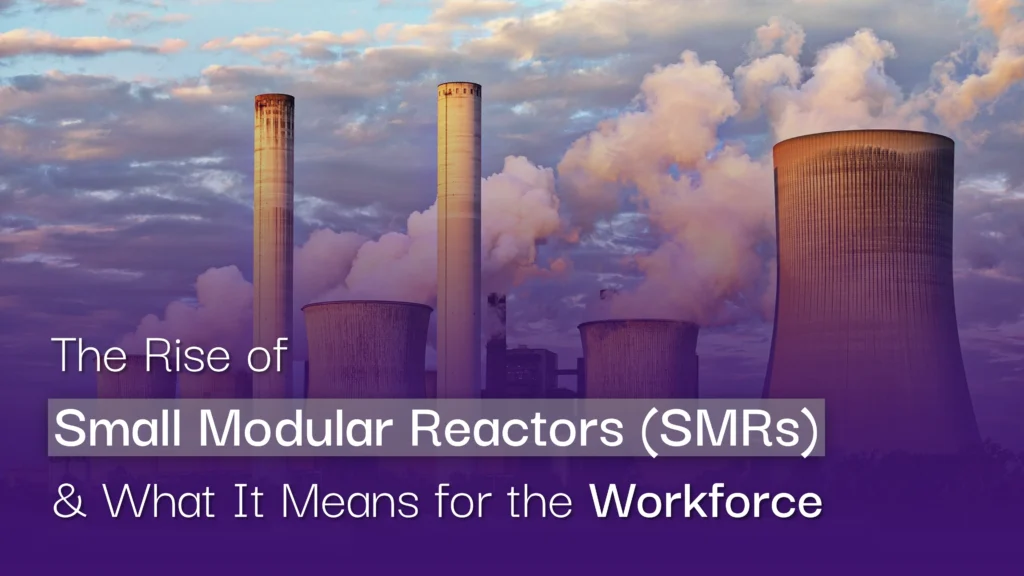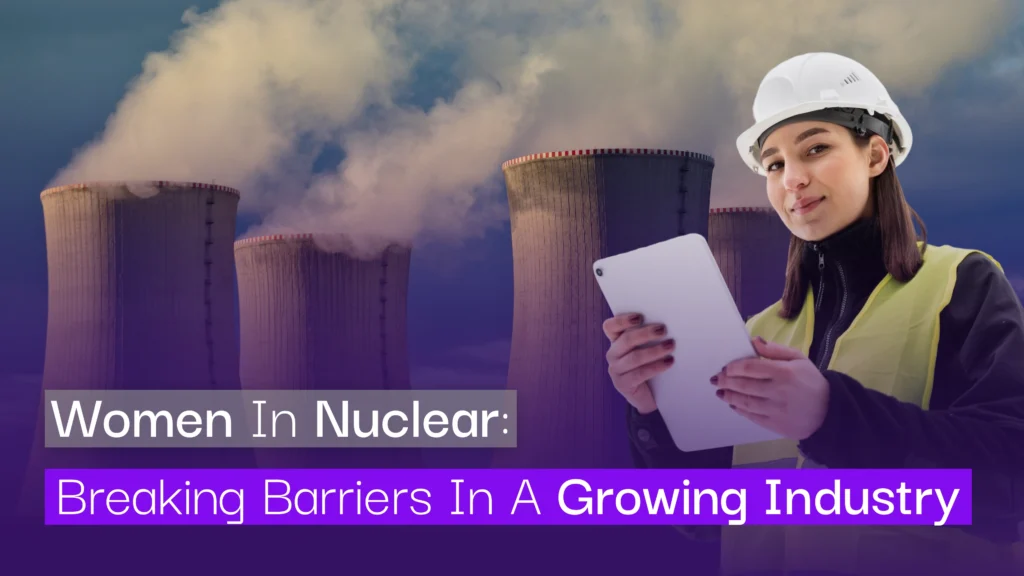The global push for cleaner, more reliable energy is reshaping the nuclear industry, and at the heart of this transformation are Nuclear SMRs, nuclear small modular reactors that promise safer, scalable, and cost-effective power generation. Unlike traditional large-scale nuclear plants, which require significant investment and long construction timelines, SMRs represent a new generation of nuclear innovation. They are designed to be modular, flexible, and more easily deployed in diverse settings.
But the adoption of SMRs is not just about technology it is equally about people. The rollout of SMRs will create an entirely new wave of opportunities in nuclear power jobs, engineering, operations, project management, safety, and regulatory compliance. In this way, SMRs are not only advancing energy systems but also shaping the next generation of nuclear careers.
Companies like TRX International are already at the forefront of this shift, providing nuclear staffing solutions and connecting organizations with the nuclear workforce specialists needed to deliver these groundbreaking projects. Organizations looking to hire nuclear engineers or recruit nuclear professionals for SMR projects are turning to TRX International for expert guidance and long-term talent acquisition strategies.
Understanding Small Modular Reactors (SMRs)
Nuclear small modular reactors are advanced nuclear power plants designed to produce up to 300 megawatts of electricity per module. While this is less than traditional gigawatt-scale reactors, the benefit lies in their scalability and deployment flexibility. SMRs can be manufactured in a factory setting, transported to the site, and installed much more quickly than traditional plants.
This modular approach means countries can add capacity incrementally as demand grows, rather than committing to massive, decades-long projects from the start. For developing economies or regions with smaller grids, SMRs represent an especially valuable solution.
Key advantages of SMRs include:
- Lower upfront capital costs compared to conventional nuclear plants, making them more accessible to a wider range of nations and private utilities.
- Enhanced safety features and passive cooling systems that rely less on human intervention, reducing the risk of accidents.
- Shorter construction timelines, thanks to modular factory-based production.
- Ability to integrate with renewable energy sources, helping balance intermittent wind and solar generation.
- Reduced environmental footprint, with smaller land requirements and limited waste output.
While nuclear fusion continues to represent the long-term vision for limitless clean energy, SMRs offer a near-term solution that is deployable worldwide, especially in regions needing reliable baseload power to stabilize their energy mix.
How SMRs Will Impact the Nuclear Workforce
The rise of SMRs will fundamentally reshape demand for nuclear careers in several ways. Unlike older nuclear plants, SMRs involve more compact designs, advanced safety systems, and modern control technologies. This creates demand for new skill sets that blend traditional engineering expertise with digital and automation capabilities.
SMR projects will need experts in:
- Modular reactor engineering and design to oversee the unique construction process.
- Advanced safety systems and regulatory compliance, ensuring reactors meet international standards.
- Remote monitoring and AI-based diagnostics, where engineers use predictive analytics to prevent downtime.
- Grid integration and hybrid energy systems, ensuring SMRs work seamlessly alongside renewables.
According to industry forecasts, nuclear engineering jobs linked to SMR projects will grow steadily over the next decade. Beyond engineering, careers in construction, project planning, environmental monitoring, and operations management will also see significant growth.
TRX International plays an important role here by bridging the talent gap. They are actively recruiting nuclear specialists, engineers, safety experts, and project managers with the skills to meet modern reactor requirements ensuring companies avoid delays and maintain high standards of safety and performance.
Nuclear Recruitment in the SMR Era
The transition to SMRs also means nuclear recruitment strategies must evolve. In the past, hiring for nuclear plants often focused on candidates with direct large-scale fission reactor experience. Today, however, organizations must expand their scope and seek talent with a broader skill base blending nuclear knowledge with mechanical, electrical, and even software expertise.
This includes:
- Engineers trained in modular construction techniques and prefabrication processes.
- Operators capable of managing next-generation digital control systems.
- Safety professionals familiar with new international nuclear regulatory frameworks.
- Data scientists and analysts who can use AI and machine learning to optimize reactor efficiency and reduce operational risks.
TRX International, with its global reach and deep sector expertise, specializes in matching candidates with the unique demands of SMR projects. By providing nuclear staffing services tailored to SMRs, they ensure critical nuclear power jobs are filled quickly and effectively. This approach supports not only immediate hiring needs but also long-term nuclear talent acquisition and workforce development strategies.
The Link Between SMRs and Nuclear Fusion Development
While SMRs and nuclear fusion are distinct technologies, they share an important connection: workforce sustainability. Nuclear fusion is widely seen as the ultimate solution for clean, limitless energy, but it remains several decades away from large-scale commercialization. In the meantime, SMRs provide a vital platform to keep nuclear expertise alive and growing.
Through SMRs, the nuclear industry benefits from:
- Knowledge transfer between fission-based SMR projects and fusion research initiatives.
- Continued innovation in materials science, safety systems, and reactor designs.
- Stronger international collaboration, as countries share lessons from SMR deployment that can inform future fusion projects.
For professionals in the industry, SMR experience is highly transferable to fusion. Engineers and specialists working on SMRs today will be well-positioned to transition into fusion roles tomorrow, ensuring long-term job security and professional growth.
The Role of TRX International in Building the Future Workforce
As the industry evolves, TRX International has become a trusted partner in nuclear workforce planning. Their tailored nuclear staffing solutions cover every phase of SMR deployment, from feasibility studies and construction to commissioning and operations.
Their recruitment expertise spans:
- Nuclear engineering jobs for SMR design, construction, and commissioning.
- Specialist roles in safety analysis, licensing, and regulatory compliance.
- Operational staff for ongoing plant management and efficiency.
- Skilled trades for construction, welding, and modular assembly.
With decades of experience, TRX International ensures that organizations not only hire nuclear experts but also retain them for long-term success. Their nuclear staffing solutions reduce risks of project delays, maintain regulatory compliance, and improve operational readiness.
By acting as both a recruiter and a strategic workforce partner, TRX International helps clients anticipate challenges and build sustainable teams that can adapt to the rapidly changing nuclear landscape.
Why SMRs Could Attract the Next Generation of Talent
One of the ongoing challenges in the nuclear industry is attracting younger professionals. Many graduates perceive nuclear as a traditional field, but SMRs with their innovative designs, sustainability benefits, and global deployment potential offer a fresh and exciting career path.
For new entrants, SMRs provide:
- Opportunities to work with cutting-edge technologies at the intersection of nuclear, digital systems, and renewable integration.
- International career pathways, as SMR projects are planned across Europe, North America, Asia, and the Middle East.
- Direct contributions to climate goals, making the work personally and socially meaningful.
- Competitive salaries and long-term job stability, as SMRs will require skilled professionals for decades.
By partnering with recruitment leaders like TRX International, young engineers and scientists gain access to a wide range of opportunities in the expanding SMR market. Employers benefit by hiring nuclear workforce specialists who are motivated to support innovation and clean energy development.
Also Read: The Future of Nuclear Safety Standards and Global Regulations
Final Thoughts
The rise of nuclear small modular reactors marks a turning point for the global nuclear industry one that will reshape not just how we produce energy, but also who produces it. SMRs are more than a technological advancement; they represent a new workforce revolution. From nuclear recruitment to specialized training, the challenges ahead are significant but so are the opportunities.
Whether you are an experienced engineer, a recent graduate, or an organization seeking skilled talent, the SMR revolution offers a unique chance to be part of a cleaner, more resilient energy future. With TRX International leading the way in nuclear staffing services, both professionals and companies can be confident they have the right partner to navigate this exciting transformation.
FAQs
Q1. What are small modular reactors (SMRs)?
SMRs are advanced nuclear reactors with smaller power output than traditional plants, designed for scalability, enhanced safety, and lower construction costs.
Q2. How will SMRs affect nuclear recruitment?
SMRs will require new skill sets in engineering, operations, safety, and digital systems, creating demand for nuclear power jobs. Organizations will need to hire nuclear engineers and recruit nuclear specialists with broader expertise.
Q3. Are SMRs connected to nuclear fusion development?
While different technologies, SMRs help sustain and grow nuclear expertise. This workforce readiness will support future nuclear fusion projects when they scale commercially.
Q4. Why is TRX International important in the SMR workforce transition?
TRX International provides specialized nuclear staffing solutions, ensuring organizations have qualified professionals for every phase of SMR deployment—from design to operations.
Q5. What career opportunities will SMRs create?
SMRs will generate jobs in nuclear engineering, safety analysis, operations, construction, and regulatory compliance. Companies can also hire nuclear specialists and recruit nuclear workforce teams globally to meet demand.






